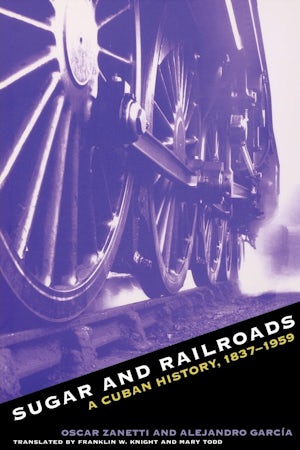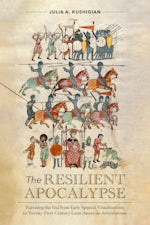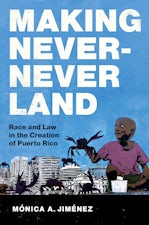Sugar and Railroads
A Cuban History, 1837-1959
By Oscar Zanetti, Alejandro Garcia
Translated by Franklin W. Knight and Mary Todd
528 pp., 6.125 x 9.25, 33 illus., 9 maps, 5 figs., notes, bibl., index
-
Paperback ISBN: 978-0-8078-4692-6
Published: August 1998 -
E-book EPUB ISBN: 978-0-8078-6643-6
Published: October 2017 -
E-book PDF ISBN: 979-8-8908-6912-8
Published: October 2017
Buy this Book
- Paperback $69.00
- E-Book $29.99
Awards & distinctions
1989 Elsa Goveia Prize, Association of Caribbean Historians
More broadly, the book uses the development of the Cuban rail transport system to provide a fascinating perspective on Cuban history, particularly the story of its predominant agro-industry, sugar. While railroads facilitated the sugar industry's rapid growth after 1837, the authors argue, sugar interests determined where railroads would be built and who would benefit
from them. Zanetti and García explore the implications of this symbiotic relationship for the technological development of the railroads, the economic evolution of Cuba, and the lives of the railroad workers.
As this work shows, the economic benefits that accompanied the rise of railroads in Europe and the United States were not repeated in Cuba. Sugar and Railroads provides a poignant demonstration of the fact that technological progress alone is far from sufficient for development.
About the Authors
Oscar Zanetti is a professor of history at the University of Havana.
For more information about Oscar Zanetti, visit
the
Author
Page.
Alejandro García is a professor of history at the University of Havana.
For more information about Alejandro Garcia, visit
the
Author
Page.
Reviews
" A remarkable achievement. . . . A brilliantly researched and well-argued book, one that not only contributes to Cuban historiography but also provides a rich case study for the growing numbers of U.S. historians interested in labor and industry across the Americas."--Journal of American History
"This study impressively documents the machinations of foreign entrepreneurs and the complicity of the domestic elite that led to that surrendering of control. . . . A very important study, opening our eyes to the complexity of Cuban economic history."--Latin American Studies
"[This book] will provide the English reading public with a taste of Cuban historical writing at its best. . . . The book is not just an indispensable work for railway buffs and historians of Cuba but will also be of immense value for anyone researching the history of development and underdevelopment in the Caribbean and Latin America."--Latin American Research Review
"Breathes new life into a topic that has been relatively difficult to study outside of Cuba. . . . Recommended for students of Cuban history."--Colonial Latin American Historical Review
"An example of work to which the North American scholarly community has had too little access. Set in a deterministic, though by no means simplistic, Marxism, the book offers access to a rich variety of Cuban archival sources. . . . [Includes] useful information and illuminating insights."--The Historian
"One of the most important works in Cuban economic history of the last half century. A brilliant analysis of the changing relationship between Cuba's railroads and sugar plantations which demonstrates how, in tandem, they promoted colonial and neocolonial dependence. Masterfully examines the connection between technology, society, and politics in a plantation setting."--Francisco A. Scarano, University of Wisconsin-Madison




